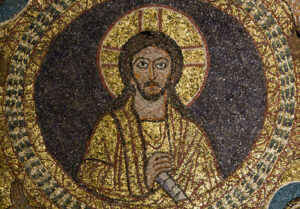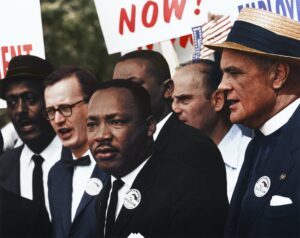Trigger warning: This article contains discussions of transphobia, homophobia, and antisemitism, including arguments by bigots phrased as bigots might phrase them, for the purpose of dismantling them and to give historical context. It also contains discussion of Nazi and other eugenicist violence against these marginalized groups.
My small act of rebellion in a household where my mother had become gripped by fundamentalist evangelism was reading Harry Potter. It seemed self-evident to me—and still is—that no demon was going to burst out of the pages and possess me. Mother sent me to camp in middle school, and as part of a divorce power struggle, dad gave me pocket money. I managed to get ahold of Harry Potter and brought it with me to camp. They had dances almost every sundown on an outdoor soccer field. Destiny’s Child thumped and the girls danced in groups while the boys watched along the periphery like sulking, terrified predatory animals. Occasionally one would get his courage up to try and peel off one of one of the girls from the group, and it was a pure lottery whether he’d get enthusiasm or scorn. I sat on the grass in a farther orbit than the boys and switched between reading Harry Potter and people watching.
Middle school is about trying on new identities, and kids were wearing their genders like ill-fitting costumes. I got teased for a low voice. One night, I nearly got in trouble for being in the wrong section of camp because a counselor from another cabin heard me and insisted I sounded like a boy. She told me to stop “making that voice.” I started speaking at the top of my register and read constantly to take my mind off it. I never fell in love with the Harry Potter books the way other kids did—I was a little bit old for them—but that summer, as I felt the pressure to choose between “girl” or “boy,” I chose the equally fantastic “wizard.”
This isn’t unique. The unhappy child who escapes into fantasy is so cliché that Jo Rowling wrote a whole book series on the premise. It just so happens a lot of unhappy, unloved children are unloved because they’re queer. And so, fans of Harry Potter now face a dilemma. With an essay and a series of embarrassing tweet threads on gender and trans issues, Rowling is well and truly out as an unapologetic bigot. Now the question is—what the hell do we do with Harry Potter?
Before J. K. Rowling started writing transphobic screeds, there were warning signs that she was a little bit off. The Gringotts Bank was run by hook-nosed goblins in what seemed like an antisemitic caricature. Dumbledore was gay, but it wasn’t in the books. Rather, it was implied that Dumbledore had a romantic entanglement with someone who was incredibly evil and had later become good as a celibate old man. Well, fine, children’s books can’t occupy themselves with the sex lives of old men.
There was more, though. Rowling wrote mysteries under the pen name of Robert Galbraith. Robert Galbraith Heath was the forefather of gay and trans conversion therapy who did gruesome experiments on homosexual men’s brains. He believed that transness and homosexuality was caused by the physical structure of the brain and could be cured by mutilating it. Critics point out Rowling used the name first in 2013, and Health’s psychiatric surgery experiments were only publicized widely in 2016. With respect to them, the pen name would not have raised any eyebrows if Rowling hadn’t “liked” transphobic posts on Twitter. Eventually, she dove fully into radical and open transphobia.
Rowling has unfathomable wealth and therefore no limitations on her time. She came by that wealth by writing fantasy. She could do anything, so it’s almost cosmically disappointing she would spend her time being a transphobe. A recent essay in Current Affairs by Nathan J. Robinson covers this strange contradiction between Rowling’s imaginative fiction and lack of imagination on the experiences of trans people and what is politically possible. But why is her imagination so stunted?
Rowling is a particular kind of radical feminist who believes the oppression of women is rooted in women’s bodies (to be clear, not all radical feminists believe this). To paraphrase her argument, women’s bodies—their physical size across populations in comparison to men, as well as their reproductive capacity— is what defines womanhood in relationship to masculinity. She insists there is no gender, only sex, and that the differences are the root of the oppression. That is, oppression is a material condition and caused by physical differences, not by gender identity. That oppression is exploited by men because of men’s relative size and power on an individual level, and because of the structural power that men have accumulated over time to oppress women as a population on a societal level.
As Marxists, we must be very careful because this argument seems fairly coherent. It is, on the surface, materialist—that is, it dismisses gender entirely as idealism and points to embodied sex defining whether we are men or women (nonbinary is gender is dismissed entirely). We may decide Rowling’s poor imagination adds to her materialist bona fides. After all, what is materialism except a rejection of the abstract as idealistic? But this is a sleight of hand—conflating the immaterial and idealistic with the abstract. Basing our understanding of sex and gender on that conflation would be woefully, dangerously incomplete.
Let’s back up. If I were speaking directly to Rowling, I’d be making an error in rebutting her argument at all. Rowling’s anti-trans points about biology especially are decades old, tired, and already debunked. To debate Rowling, I would have to concede on some level that this is a topic on which reasonable people may disagree, and that Rowling is a good faith interocular. I don’t concede any of this. Rowling’s up-and-coming nine hundred page mystery features a violent trans person or cross dresser. Rowling makes no distinction between crossdressing men and trans women, , and given that this understanding of gender expression bears no correspondence to reality, it is impossible to know if she means her killer to be trans. The book’s clumsy, inflammatory treatment of gender makes any pretense she is reasonable even more ridiculous. Almost more offensive to me as a writer and aesthete: the killer crossdresser is a cliché of crime novels so worn out it was a twenty years old by the time her friend Val McDermid resurrected it in the 1990s with The Mermaids Singing. Even her art on the topic is a pale imitation of something hackneyed.
Aesthetics aside, there is something really soul-killing about having to mount a case for one’s own humanity rather than simply treating it as a bedrock on which I can build an argument. So, my humanity is not up for debate. However, as a concession to reasonable people who’ve simply never thought about gender and what it means to be trans, here is a detailed and cited rebuttal to Ms. Rowling’s claims about biology and politics. Here’s a second one. This interview with Judith Butler is a flawless dismantling of Rowling’s trans-exclusionary false feminism.
I find all of this corrosively tedious. J. K. Rowling doesn’t claim she knows better than trans people what their gender is because she has any rational basis for believing it. Her writing on the topic is the slipshod product of a mind dulled by lack of editing—she hasn’t been told “no” for decades. Rowling is doing this because her bigoted screed demands the attention and rebuttal and effort of scientists. It demands that tens of thousands of trans people defy her at her most hateful and half-assed in the hopes we can save our own lives from the hatred she’s infecting others with. It is pure self-glorification. You don’t say who you are; science doesn’t say who you are. God himself doesn’t enter the picture. Jo Rowling, in her mossy Scottish castle in the rain, dictates who is a man and who is a woman and whether nonbinary people exist at all. This is not a rational argument. It is the exercise of power, and its sole purpose is to wear you down.
As much as I would like to write her off entirely—and encourage anyone to avoid engaging transphobes at all, because they want power and not discussion—how we ought to speak to a bigot and how we ought to speak among ourselves are different things. In friendly company, we may admit it is disquieting that, on the surface, Rowling’s argument appears to be a materialist one that is not incompatible with Marxism, given its attention to bodies, power and oppression. In fact, her argument has a lot more to do with Marxism and capitalism than you might think. Let’s tackle it.
Moishe Postone’s “Anti-Semitism and National Socialism” develops a critical theory of Nazi antisemitism. In this essay, he argues that some Marxist theory after Marx did not sufficiently distinguish between concrete and abstract labor, which resulted in a deficient critique of capitalism. In Postone’s analysis, this failure leads all too easily to a valorization of pure, ahistorical forms of concrete labor, while attributing society’s ills to the opaque, “abstract” power of money, finance and banking, rather than to the social relations of capitalism. One term Marx employs for this obscuring of social relations is alienation. Precisely because of how alienation obscures even itself, and how it’s as omnipresent as the air we breathe, it can, if unexamined, seem to be an aspect of the natural world rather than arising from our social relations. And if it is an aspect of the natural world rather than a social relation, it becomes easy to look for what, in nature (or, in Nazi terms, what perversion of nature), is the cause of that alienation.
The “material” wasn’t just an ontological question to the Nazis as it is to us—a question of what is true and how we know it. The material is The Natural, and The Natural, according to them, is goodness itself. Abstraction, its opposite, is a perversion of Nature and the root of all evil. According to the Nazis, Jews are a literal physical embodiment of all abstractions: rootless (as opposed to “of the land”), cosmopolitan (as opposed to agrarian or artisanal), bankers (associated with abstract value in the form of currency, as opposed to laborers), and all of this is owing to the biology of the Jews. This is why Nazis insist on classifying Judaism as a “race.” It turns Judaism into a degenerate biological category in a way that calling them an ethnicity or religion doesn’t accomplish. The extinction of the Jews was therefore not a tertiary project to the Nazis, nor a mere excuse to fuel their power grab. It was the heart and soul of why they sought power and what they wanted to do with it. According to Postone:
The fetishized opposition of the concrete material and the abstract, of the “natural” and the “artificial,” became translated as the world-historically significant racial opposition of the Aryans and the Jews. Modern anti-Semitism involves a biologization of capitalism—which itself is only understood in terms of its manifest abstract dimension—as International Jewry.”
When a Marxist writes about “fetishizing” something, they mean a physical object, the body of a person, or set of persons are treated as the manifestation of an idea or set of ideas. In this case, Jews were fetishized by the Nazis as a physical, biological manifestation of a set of ideas related to capitalist exploitation Those concepts were then attacked by attacking the bodies of the Jewish “race.”
In her essay “The Eradication of ‘Talmudic Abstractions’: Anti-Semitism, Transmisogyny and the National Socialist Project” Joni Alizah Cohen applies Postone’s framework to gay and trans people, who were also targeted for extinction by the Nazis. At the time were no distinctions made between these two groups. Homosexual men were viewed as being on the same spectrum as trans women—as a sort of sliding scale of “deviant” rejection of embodied, “natural” masculinity. A gay man merely rejected his “natural” reproductive role (to them, a rejection of biological male-ness) but presented as men. Trans women went further and rejected maleness entirely, both role and presentation. If, for Nazis, “the biological is understood as the fundamental terrain of politics and history,” then trans women, to Nazis, are womanhood without a female body, the abstracted woman without any of the reproductive virtues that make her useful to the propagation of the Aryan race. Nazis resist alternative gender expressions, not because a social construct is being defied, but because they are perversions of “nature.” Women aren’t women because it’s a social role, they are women because they carry children and are weaker than men. Trans misogyny was the logical response to trans woman’s threat to “the purity of biological sex and the destruction of gender roles so essential in the battle for racial primary.”
And here, Nazi thinking about transgender people and what makes someone a woman begins to sound just like Rowling’s. That’s because it is; the arguments are identical. I’m not saying Rowling is a Nazi and that’s how she came to these conclusions. She starts with some reasonable assumptions and makes subtle errors that are common even within Marxist circles. But the sum of each error adds up to something monstrous. Like the Nazis, Rowling fetishizes gender, seeks to protect biological sex from “abstract” gender, and ends up defending a notion of pure biological sex over what she believes is the rootless, abstract gender of the trans person. Now that Rowling has arrived at an argument identical to the Nazi view on gender, she is going to find herself in the frequent company of actual Nazis, as will anyone who was convinced by her activism. The Nazis have absolutely noticed. This is a wedge issue being used to exploit existing prejudices and radicalize to the far-right people who believe themselves to be progressive.
I should be clear that the Nazi obsession with “natural” biology does not make their oppression of Jewish people rooted in Jewish biology (as they claim). Likewise, transphobes’ and misogynists’ obsession with biology does not make the oppression of women and trans people rooted in their biology. The body, pain, and physical safety is a natural vulnerability for every human being on earth. That bigots choose the body as the site of oppression does not make a body the cause of the oppression. In the end, the Nazis’ preoccupation with bodies does not constitute a true “material” analysis — far from it. But the connection to Nazi fascism, goes further. Fascism has an integral relationship to capitalism, representing for some Marxists the ultimate expression of predatory capitalism. Rowling is an incredibly wealthy woman, a capitalist, and it is only natural that she should slide into an unwitting fascism, and into transphobia as an expression of that fascism. Her transphobia, her fascism, her lack of imagination, and her wealth are not separate things, but all expressions of a contiguous evil. This is why the liberalism (by which I mean, the political and philosophical underpinnings of capitalism) from where Rowling sprang is not equipped to recognize that Rowling’s wealth is connected to her transphobia; it contains no critique of capitalism. As a result, it can’t come up with ways to keep trans people safe from her. I think that’s damning.
So, what to do about Rowling? More important—what to do about Harry Potter? It still has its (aging) fans. I’ve heard several proposals. First, “Death of the Author” — Barthes’ essay, I should be clear. Simply amputate the bad part of Rowling’s body of work (Rowling, of course) from the good parts (her writing, I assume). That is not what “Death of the Author” actually says, though. It’s a call to not treat a work as a perfect psychoanalytic map of the writer. It’s a tool, not a material description of the relation of a writer to her work. In truth, buying Harry Potter products puts money in Rowling’s pocket. So maybe just don’t buy it—buy used and read fanfic. That’s still not straightforwardly okay, though. Even if a sizable chunk of fans managed to pirate all the books, to only interact with the free parts of fandom, that kind of consumption still leaves J. K. Rowling platformed and famous. A book is a product whose branding is entwined with its author, and we can’t now untangle that relationship just because we’d like to.
I’m a little bit spooked by the florid and tender reassurance I’ve seen other writers offer fans. They say these books are still meaningful, that you are still valid for enjoying them and mean old Jo Rowling can’t take them from you. Perhaps my little “aging” comment in the previous paragraph irked you. Well, the average age of someone who grew up with Harry Potter is now thirty, and the intended audience of the first book is eleven. We’re not children anymore and don’t need infantilizing validation of our consumptive habits.
It’s tough for me to make a purely Biblical argument about that. The Industrial Revolution spawned capitalism very recently, and the mass production of idols—the encouragement to make the consumption of a product into a closely held identity that we are obligated to cradle and protect—is new. It’s also incredibly insidious. For instance, Laura Bailey, a voice actress, recently got multiple graphic death threats for voicing a video game character some fans didn’t like. That’s bad. Less obvious, but still bad: brands did joke posts about marking books with food or beverages, ruining the book. Book fandom went into absolute performative fits. They didn’t know which books they were, even. It was book, sacred object, and destruction of it is bad. Librarians have to weed books—as in, destroy them because they are not relevant or are worn out—all the time. This outrages many book fans to hear even though it’s necessary for book preservation. A large, vocal group of book consumers somewhere will always be mad that anyone would destroy a book, ever.
This is an example of the fetishization of the commodity. Once we have reached the point of identifying with the consumption of a commodity, it might be time for us as Christians to question whether that’s spiritually healthy. Enjoyment of is not identification with; “I like a book” is not “I am the book.” Perhaps if there are people who identify so strongly with Harry Potter that they need absolute comfort and permission to keep engaging with it—despite any engagement adding to Rowling’s fame—maybe that’s not good. I am disturbed by how quickly adults jump in to rescue other adults from the terrible burden of having to sit with being uncomfortable even for a moment, to dispense a pardon for an ethical problem that has not been solved — that of elevating an influential transphobe’s voice. The fact this is a children’s book means that, as a fetish object, one of the things it embodies is comfort. To people who hold it close to their identity, it can feel as if we are asking them to give up comfort altogether.
First of all, this is illusory— comfort exists outside of Harry Potter, and would exist if every copy disappeared tomorrow. But as I have written in The Bias before, citing Simone Weil, the ability to sit with discomfort is a core part of what God demands of us in our devotion. Hell —adulthood demands we sit with that discomfort. We should be incredibly suspicious of anything that aims to “rescue” us from that. Being radically present with one another through suffering is a more mature and real and loving source of comfort than regressing to a feeling from childhood by clinging to a product, but it requires us to sit with discomfort first. When we ossify alive things into a product, things we should instead find in one another and in God like compassion and comfort—that is a kind of idolatry.
The Christian right held book burnings of Harry Potter back when it was released, and I recognize the strangeness of a Christian critique from the left that says we should dispense with Harry Potter as an idol. My assertion that a book can be an idol (and therefore might be destroyed) probably raises some hackles because of the Nazi fondness for book burnings. The raid of the Institut für Sexualwissenschaft and the loss of twenty thousand books of research on trans and other queer identities comes to mind. No need to worry. We shouldn’t hold a book burning for Harry Potter because it’s not necessary—we cannot purge evil by turning Rowling’s books into fetish objects containing Rowling’s evil and then destroy them. Copies of Harry Potter are not Rowling’s Horcruxes. Instead, I’d like to focus on Rowling herself as a living idol we ought to tear down (no burning required).
Liberalism would have you believe history is a series of influential figures who move it rather than the movement of classes. We are to believe Rowling is a staggering genius without whom her editors, assistant editors, paper millers, and Daniel Radcliffe would be nothing. But Rowling’s current editorial team at Little, Brown threatened to strike. A video game developer with a new Harry Potter game has leaked its discomfort with her transphobia, and publicly said the game had very little input from her. Several actors from the Potter films have made affirmative statements on trans rights following Rowling’s comments. She is published because of the labor of thousands of workers. She has movies because other people starred in them, wrote the scripts, and lit the sets. She has wealth and fame because her books have fans. If nobody supported her, she would have nothing. And although she does have capital and wealth, we can take that from her too. She is outnumbered.
We don’t have to wait for time to wear down her influence, or for her to be long gone to tear down the infrastructure that supports her. If we wanted to, we could bury her legacy within her lifetime. But we’ll probably have to tear down Harry Potter to get to her.




